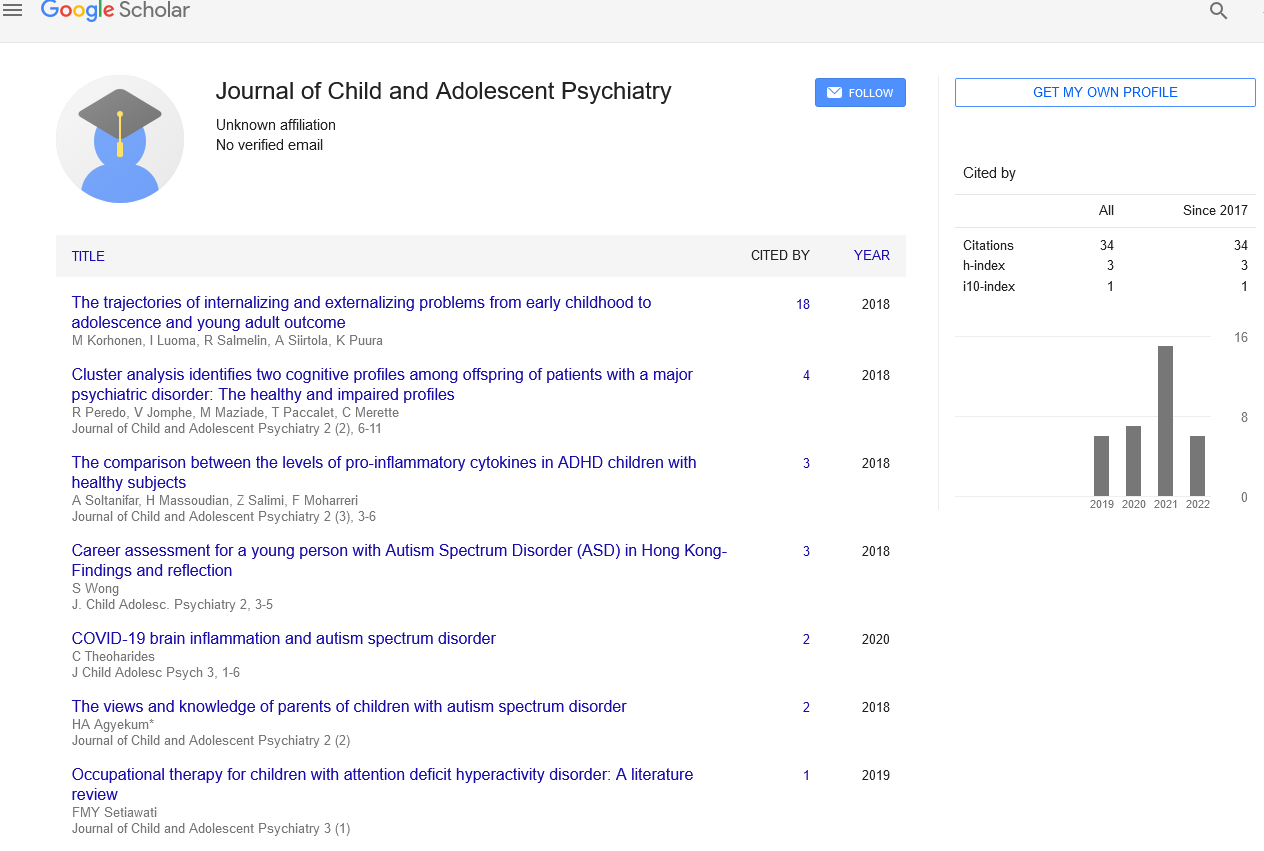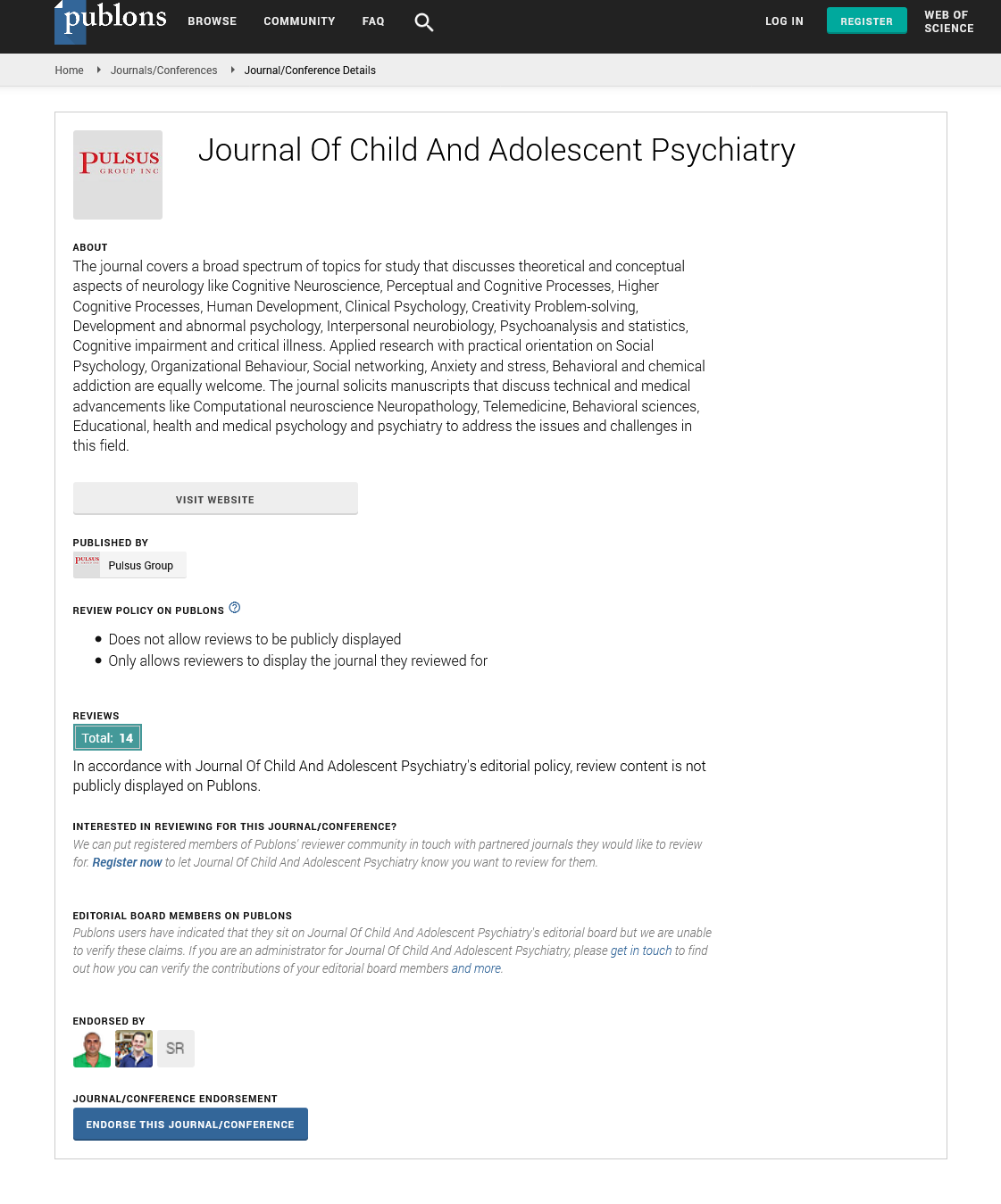Cultural and social justice responsiveness in assessment with children and adolescents
Received: 04-Dec-2017 Accepted Date: Dec 06, 2017; Published: 11-Dec-2017
Citation: Kassan A. Cultural and social justice responsiveness in assessment with children and adolescents. J Child Adolescent Psych 2017;1(1):6-7.
This open-access article is distributed under the terms of the Creative Commons Attribution Non-Commercial License (CC BY-NC) (http://creativecommons.org/licenses/by-nc/4.0/), which permits reuse, distribution and reproduction of the article, provided that the original work is properly cited and the reuse is restricted to noncommercial purposes. For commercial reuse, contact reprints@pulsus.com
Introduction
The importance of attending to client diversity is hard to refute across mental health fields [1-5]. Yet, clients frequently report instances of cultural and social insensitivity on the part of mental health professionals [6-8]. Attending to client diversity is critical in order to ensure a collaborative helping relationship, which leads to a more comprehensive and holistic assessment [9]. Whether one is conducting an assessment in the form of a psychiatric evaluation, a structured psycho-social battery, or a clinical interview, the role and impact of culture and social justice need to be considered.
Cultural and social justice responsiveness
In order to be responsive to a client’s cultural background in the assessment process, it is helpful to adopt an inclusive conceptualization of culture. From this perspective, an individual’s cultural background includes an array of self-selected variables such as age, race, ethnicity, gender, sexual/affectional orientation, (dis)ability, religion, spirituality, indigenous ancestry, nationality, status in country, social class, accessibility, physicality, etc. [10-12]. Moreover, these multiple cultural identities and social locations continuously intersect and shift. As such, a client’s cultural background needs to be assessed upon the first consultation, but also considered as treatment progresses.
Taking it to the next level and considering the importance of social justice, mental health professionals who conduct assessments are in a position to address a client’s societal barriers, directly and indirectly. Social justice can be understood as a professional commitment, an action-oriented process, and a desired goal [10,13]. The process entails investigating and dismantling inequities related to the cultural identities and social locations enumerated above. Such an action-oriented process requires critical, reflective, ongoing, community-driven multidisciplinary research, which addresses issues of inequity, power, privilege, and oppression, and includes traditional and indigenous ways of knowing, with the aim of challenging unjust policies and systems [10]. The goal then is the full and equitable engagement of all groups within society [13]. From this perspective, social justice efforts become the responsibility of all mental health professionals and their respective disciplines.
Bringing this information together, being culturally responsive and socially just throughout the assessment process means working with a client’s presenting concerns in a way that is in line with their values, beliefs, and worldviews [7,14].
The importance of attending to diversity in assessment
Attending to a client’s diversity in such an inclusive manner allows mental health professionals to conduct assessments that are more collaborative, holistic, and individualized. Asking a client about their cultural identities and social locations, allows for information to be self-identified as opposed to ascribed [13,15]. This cultural and social information sheds light on how a person views themselves as well as which aspects of their cultural background is most important to them (and perhaps even challenging) at the time of assessment [11]. Furthermore, understanding client diversity provides mental health professionals with a glimpse into critical concepts such as their values, beliefs, and worldviews. Even when a client is seeking services for issues that seem completely unrelated to their cultural background, such information should be considered as contextual and important [6,11]. This contextual information is critical in that it leads to a better understanding of how one might comprehend their mental health challenge. Moreover, it can also provide insight into possible areas of oppression.
Considerations for children and adolescents
When it comes to the cultural and social needs of children and adolescents more specifically, the complexity often increases. That is, child and adolescent clients enter an assessment with their own multiple and intersecting cultural identities and social locations, along with various developmental considerations and unique family situations. As such, children and adolescents may not be as readily able to discuss the cultural and social factors that are most important and influential in their lives [12,15] Nonetheless, mental health professionals have to find other ways of accessing this critical information, such as asking a child or adolescent client about what is important to them, how they see themselves, what their circumstances are, etc. Moreover, it is essential to enlist parents in these cultural and social conversations in order to obtain a more holistic picture of the client in question and their context.
It is clear that when this information is integrated into a child or adolescent’s assessment, a more holistic picture of their mental health concerns can emerge [9]. In fact, the American Psychiatric Association (2013) suggests that a diagnosis cannot be made without first assessing such cultural and social understandings. That is, the Diagnostic and Statistical Manual of Mental Disorders explicitly states that mental health professionals need to conduct a cultural information interview to fully understand a client’s background and context. As mentioned earlier, while such recommendations have been longstanding, clients continue to encounter culturally and socially insensitive situations when seeking mental health services [6-8].
Thus, it is vital for professions across various mental health fields to integrate cultural and social information in their client assessments. The best and most direct way of doing so is simply by asking a client (and/or their family) about their cultural background. Through this conversation, critical information about their multiple and intersecting cultural identities and social locations will emerge. In order to do so in a culturally responsive and socially just manner, it has been recommended that mental health professionals first begin by exploring their own cultural background [6,16]. Such a reflexive practice will allow them to identify areas where they may hold biases and assumptions, which could negatively impact their work. This preliminary work is especially important when conducting assessments with children and adolescents, as there are multiple levels to consider in one’s self-reflexive practice.
Conclusion
In summary, there is no uniform way for mental health professionals to assess a client’s cultural background. What has been agreed upon however is that such information is essential in informing proper diagnosis and treatment. As such, it is paramount for mental health professionals to become comfortable with the idea of having open conversations about culture and social justice with their clients. Relatedly, it is important to assess the level of social justice intervention a client, community, or system might need.
REFERENCES
- American Psychiatric Association (2013). Diagnostic and statistical manual of mental disorders (5th ed.). Washington, DC: Author.
- American Psychological Association (2002). Guidelines on multicultural education, training, research, practice, and organizational change for psychologists. Washington, DC. Retrieved from http://www.apa.org/pi/oema/resources/policy/multicultural-guidelines.aspx
- Canadian Psychological Association (2017). Canadian Code of Ethics for Psychologists (4th ed.). Ottawa, ON: Canadian Psychological Association. Retrieved from http://www.cpa.ca/docs/File/Ethics/CPA_Code_2017_4thEd.pdf
- Mental Health Commission of Canada (2016). The Case for Diversity: Building the Case to Improve Mental Health Services for Immigrant, Refugee, Ethno-cultural, and Racialized Populations. Ottawa, ON: Mental Health Commission of Canada. Retrieved from https://www.mentalhealthcommission.ca/sites/default/files/2016-10/case_for_diversity_oct_2016_eng.pdf
- Truth and Reconciliation Commission of Canada (2015). Honouring the Truth, Reconciling for the Future: Summary of the Final Report of the Truth and Reconciliation Commission of Canada. Ottawa, ON: Truth and Reconciliation Commission of Canada. Retrieved from http://nctr.ca/assets/reports/Final%20Reports/Executive_Summary_English_Web.pdf
- Arthur N, Collins S. (in press). Culture-infused counselling: Fostering socially just change processes (3rd ed.). Calgary, AB: Counselling Concepts.
- Ratts MJ, Singh AA, Nassar McMillan S, et al. Multicultural and social justice counseling competencies: Guidelines for the counseling profession. Journal of Multicultural Counseling and Development. 2016;44(1):28-48.
- Zane NWS, Nagayama Hall GC, Sue S, et al. Research on psychotherapy with culturally diverse populations. In M. J. Lambert (Ed.), Handbook of psychotherapy and behavior change (5th ed.). New York: Wiley, 2004;767-802.
- Ibrahim FA, Heuer JR. Cultural and social justice counselling: Client-specific interventions. New York, NY: Springer 2016.
- Fouad NA, Prince JP. Social justice in counselling psychology. In E. M. Altmaier and J-I C. Hansen (eds.). The Oxford Handbook in Counselling Psychology. New York, NY: Oxford University Press, 2011;856-872.
- Kassan A, Sinacore AL. Multicultural counselling competencies with female adolescents: A retrospective qualitative investigation of client experiences. Canadian Journal of Counselling and Psychotherapy/Revue canadienne de counseling et de psychothérapie, 2016;50(4):402-420.
- La Roche MJ, Maxie A. Ten considerations in addressing cultural differences in psychotherapy. Professional Psychology: Research and Practice. 2003;34(2):180-186.
- Stewart J. The school counsellor’s role in promoting social justice for refugee and immigrant children. Canadian Journal of Counselling and Psychotherapy/Revue canadienne de counseling et de psychothérapie, 2014; 48(3). Retrieved from http://cjc-rcc.ucalgary.ca/cjc/index.php/rcc/article/view/2722
- Kassan A. A feminist-multicultural approach with adolescent females: Intersecting identities and multiple social locations. In N. Arthur & S. Collins (Eds.), Culture-Infused Counselling: Fostering Socially Just Change Processes (3rd ed.). Calgary, AB: Counselling Concepts.
- Liu WM, Clay DL. Multicultural counseling competencies: Guidelines in working with children and adolescents. Journal of Mental Health Counseling. 2002;24(2):177-188.
- Sue DW. Multidimensional facets of cultural competence. Counseling Psychologist, 2001;29(6):790-821.






